|
|
|
Sort Order |
|
|
|
Items / Page
|
|
|
|
|
|
|
| Srl | Item |
| 1 |
ID:
111149
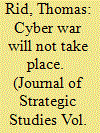

|
|
|
|
|
| Publication |
2012.
|
| Summary/Abstract |
For almost two decades, experts and defense establishments the world over have been predicting that cyber war is coming. But is it? This article argues in three steps that cyber war has never happened in the past, that cyber war does not take place in the present, and that it is unlikely that cyber war will occur in the future. It first outlines what would constitute cyber war: a potentially lethal, instrumental, and political act of force conducted through malicious code. The second part shows what cyber war is not, case-by-case. Not one single cyber offense on record constitutes an act of war on its own. The final part offers a more nuanced terminology to come to terms with cyber attacks. All politically motivated cyber attacks are merely sophisticated versions of three activities that are as old as warfare itself: sabotage, espionage, and subversion.
|
|
|
|
|
|
|
|
|
|
|
|
|
|
|
|
| 2 |
ID:
132291
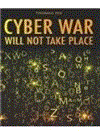

|
|
|
|
|
| Publication |
New Delhi, Pentagon Press, 2013.
|
| Description |
xvi, 218p.Hbk
|
| Standard Number |
9788182747562
|
|
|
|
|
|
|
|
|
|
|
|
Copies: C:1/I:0,R:0,Q:0
Circulation
| Accession# | Call# | Current Location | Status | Policy | Location |
| 057804 | 355.343/RID 057804 | Main | On Shelf | General | |
|
|
|
|
| 3 |
ID:
184989
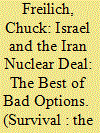

|
|
|
|
|
| Summary/Abstract |
Israel’s national security strategy in many ways has been a historic success. Once a weak, embattled state whose survival was at stake, Israel has become an essentially secure state whose existence is probably no longer in doubt. A nuclear Iran remains the only potentially existential threat, and Hizbullah a severe proximate threat. A simple process of elimination among the options available to Israel shows that a revived nuclear deal is the best of a bad lot. Sanctions, covert sabotage and a military attack are unlikely to yield long-term gains. No one knows if, when or how regime change will occur. A revived deal buys Israel the greatest amount of time and may produce new opportunities if extended. But Israel may eventually have no choice but to launch a military attack, possibly designed to force the international community to take decisive action.
|
|
|
|
|
|
|
|
|
|
|
|
|
|
|
|
| 4 |
ID:
182954
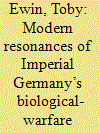

|
|
|
|
|
| Summary/Abstract |
This article summarizes published and archival information about Imperial Germany’s attempts to infect draft animals in some Allied and neutral countries with anthrax and glanders during World War I. It casts doubt on claims that the Isle of Man was among the places affected. It considers the extent to which contemporary terrorist activity more closely resembles German biological sabotage plots than it does most modern state weapons-of-mass-destruction programs.
|
|
|
|
|
|
|
|
|
|
|
|
|
|
|
|
| 5 |
ID:
120292
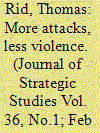

|
|
|
|
|
| Publication |
2013.
|
| Summary/Abstract |
A response to John Stone, Dale Peterson, and Gary McGraw on cyber war.
|
|
|
|
|
|
|
|
|
|
|
|
|
|
|
|
| 6 |
ID:
113140
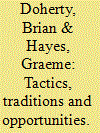

|
|
|
|
|
| Publication |
2012.
|
| Summary/Abstract |
This article compares the tactic of trashing genetically modified crops in activist campaigns in Britain and France. In Britain, most crop trashing was carried out covertly, while in France most activists undertook open, public actions. In seeking an explanation for this, the article shows that the analysis of political opportunities, dominant in comparative studies of social movements, can only take us so far. While it helps explain the occurrence of direct action, it is much less useful in explaining the tactical differences between each country. It is argued that a fuller explanation requires an understanding of how action was shaped by different activist traditions. In France, action was staged as a demonstration of serious, responsible, collective Republican citizenship; in the United Kingdom, activists combined a sceptical view of legality developing from anarchist individualism with an explicitly non-threatening, playful, ethos. The article concludes that a focus on activist traditions can provide an effective bridge between structural and cultural approaches to understanding the determinants of social movement action.
|
|
|
|
|
|
|
|
|
|
|
|
|
|
|
|
|
|
|
|
|